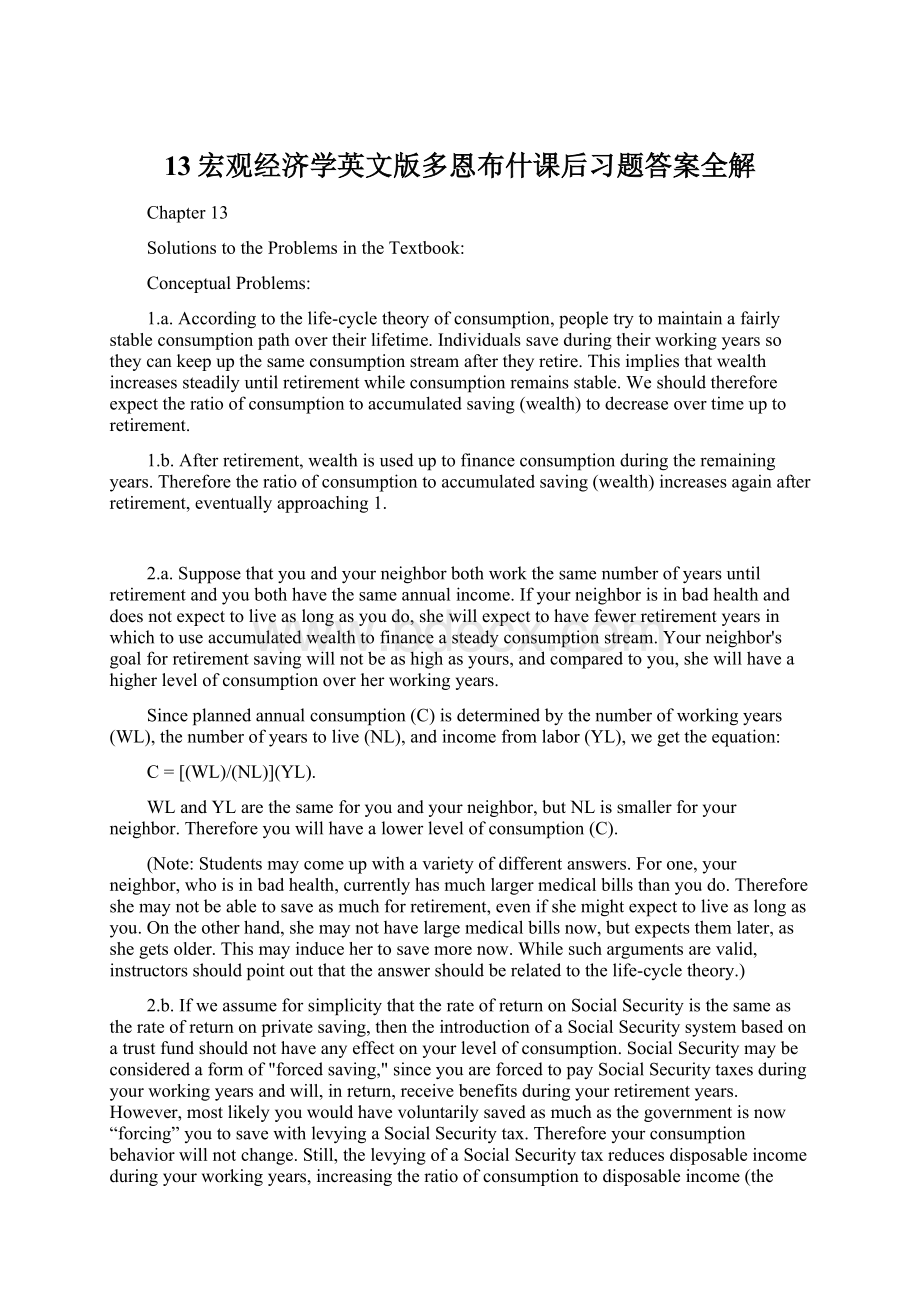13宏观经济学英文版多恩布什课后习题答案全解.docx
《13宏观经济学英文版多恩布什课后习题答案全解.docx》由会员分享,可在线阅读,更多相关《13宏观经济学英文版多恩布什课后习题答案全解.docx(11页珍藏版)》请在冰豆网上搜索。

13宏观经济学英文版多恩布什课后习题答案全解
Chapter13
SolutionstotheProblemsintheTextbook:
ConceptualProblems:
1.a.Accordingtothelife-cycletheoryofconsumption,peopletrytomaintainafairlystableconsumptionpathovertheirlifetime.Individualssaveduringtheirworkingyearssotheycankeepupthesameconsumptionstreamaftertheyretire.Thisimpliesthatwealthincreasessteadilyuntilretirementwhileconsumptionremainsstable.Weshouldthereforeexpecttheratioofconsumptiontoaccumulatedsaving(wealth)todecreaseovertimeuptoretirement.
1.b.Afterretirement,wealthisuseduptofinanceconsumptionduringtheremainingyears.Thereforetheratioofconsumptiontoaccumulatedsaving(wealth)increasesagainafterretirement,eventuallyapproaching1.
2.a.Supposethatyouandyourneighborbothworkthesamenumberofyearsuntilretirementandyoubothhavethesameannualincome.Ifyourneighborisinbadhealthanddoesnotexpecttoliveaslongasyoudo,shewillexpecttohavefewerretirementyearsinwhichtouseaccumulatedwealthtofinanceasteadyconsumptionstream.Yourneighbor'sgoalforretirementsavingwillnotbeashighasyours,andcomparedtoyou,shewillhaveahigherlevelofconsumptionoverherworkingyears.
Sinceplannedannualconsumption(C)isdeterminedbythenumberofworkingyears(WL),thenumberofyearstolive(NL),andincomefromlabor(YL),wegettheequation:
C=[(WL)/(NL)](YL).
WLandYLarethesameforyouandyourneighbor,butNLissmallerforyourneighbor.Thereforeyouwillhavealowerlevelofconsumption(C).
(Note:
Studentsmaycomeupwithavarietyofdifferentanswers.Forone,yourneighbor,whoisinbadhealth,currentlyhasmuchlargermedicalbillsthanyoudo.Thereforeshemaynotbeabletosaveasmuchforretirement,evenifshemightexpecttoliveaslongasyou.Ontheotherhand,shemaynothavelargemedicalbillsnow,butexpectsthemlater,asshegetsolder.Thismayinducehertosavemorenow.Whilesuchargumentsarevalid,instructorsshouldpointoutthattheanswershouldberelatedtothelife-cycletheory.)
2.b.IfweassumeforsimplicitythattherateofreturnonSocialSecurityisthesameastherateofreturnonprivatesaving,thentheintroductionofaSocialSecuritysystembasedonatrustfundshouldnothaveanyeffectonyourlevelofconsumption.SocialSecuritymaybeconsideredaformof"forcedsaving,"sinceyouareforcedtopaySocialSecuritytaxesduringyourworkingyearsandwill,inreturn,receivebenefitsduringyourretirementyears.However,mostlikelyyouwouldhavevoluntarilysavedasmuchasthegovernmentisnow“forcing”youtosavewithlevyingaSocialSecuritytax.Thereforeyourconsumptionbehaviorwillnotchange.Still,thelevyingofaSocialSecuritytaxreducesdisposableincomeduringyourworkingyears,increasingtheratioofconsumptiontodisposableincome(theaveragepropensitytoconsume).Ifprivatesavingweresimplyreplacedwithgovernmentsaving,nationalsavingwouldnotbeaffected.
Inreality,however,theSocialSecuritysystemisnotstrictlyfinancedthroughatrustfund,butlargelyonapay-as-you-gobasis.ThesizeoftheSocialSecuritytrustfundwasfairlyinsignificantuntilthesystemwasamendedin1983.Nowthetrustfundisincreasingand,ineffect,contributingtothefederalbudgetsurplus.Butbecauseofouragingpopulation,predictionsarethattheSocialSecuritysystemwillexperienceseverefinancialdifficultieswithinthenext20-30years.Ifthecredibilityofthesystembecomesanissue,peoplemayintensifytheirsavingefforts,sincetheynolongerfeeltheycanrelyonthepublicsystemtoprovideforthemduringretirement.Inthepast,mostoftheSocialSecuritytaxeswerenot"saved"butimmediatelyusedbythegovernmenttofinancethebenefitsofthecurrentretirees.ThisiswhymosteconomistsclaimthattheSocialSecuritysystemhasledtoadecreaseinthenationalsavingsrateandadecreaseintherateofcapitalaccumulation.Themagnitudeofthisdecrease,however,hasnotbeenclearlyestablished.
3.a.IfyougetayearlyChristmasbonus,youimmediatelytreatitaspartofyourpermanentincomeandspenditaccordingly,thatis,DC=c(DY).Inotherwords,yourcurrentconsumptionwillchangesignificantly.
3.b.IfyougetaChristmasbonusforonlythisyear,youwillconsideritastransitoryincome.Sinceyourpermanentincomeishardlyaffected,youwillconsumeonlyasmallfractionofitandsavetherest.Inotherwords,yourcurrentconsumptionwillnotbesignificantlyaffected.
4.Gamblers(orthieves)seldomhaveaverystableincome.However,theirconsumptionisdeterminedbytheirpermanentincome,thatis,theirexpectedaveragelifetimeincome.Whethertheyhavealargeorsmallincomeduringanygivenperiod,theirconsumptionpatternremainsrelativelystable,sincetheirpermanentincomeisnotsignificantlyaffectedbytemporarychangesinearnings.
5.Boththeories,intheirownway,trytoexplainwhytheshort-runmpcissmallerthanthelong-runmpc.Thelife-cycletheoryattributesthedifferencetothefactthatpeoplepreferasmoothconsumptionstreamovertheirlifetime.Thereforetheaverageexpectedlifetimeincomeisthetruedeterminantofcurrentconsumption.Thepermanentincometheorysuggeststhatthedifferenceisduetomeasurementerrors.Measuredincomehastwocomponents,thatis,permanentandtransitoryincome.Butonlypermanentincomeisatruedeterminantofcurrentconsumption.
6.a.Onepossibleexplanationcouldbethatthe“babyboomers”werestillintheirdissavingphase.Inotherwords,ifhouseholdsofthebabyboomgenerationstillhadtobuyhousesorpayforexpensesrelatedtochildcareintheirlatetwenties,theymaynothavebeenabletosaveforretirementyet.
6.b.Iftheaboveexplanationiscorrect,onecanexpectanincreaseinsavingasthese“babyboomers”age,becomemorefinanciallysolvent,andbegintoprepareforretirement.
7.Therankingfromhighesttolowestvalueshouldbefirst(a),then(d),andthen(b).Clearly,(c)shouldbelowerthan(a),butwhereexactlyitranksafterthatdependslargelyontheseverenessoftheliquidityconstraint.
8.Aseriesfollowsarandomwalkwhenfuturechangescannotbepredictedfrompastbehavior.Inotherwords,itdoesnothaveameanorclearlong-runvalue.Anymajorchangecomesaboutbecauseofrandomshocks.Hallassertedthatchangesincurrentconsumptionlargelycomefromunanticipatedchangesinincome.Accordingtothelife-cycletheoryorpermanent-incometheory,peopletrytosmoothenouttheirconsumptionstreaminsuchawaythatitsexpectedvalueisalwaysthesameineachperiod.Therefore,wecanexpressfutureconsumptionastheexpectedvalueplussomeerrorterm,thatis,somerandomvaluethatisunpredictable.Thiserrortermisashocktofutureincomethatisspreadovertheremaininglifetime.Hallsupportedthepermanent-incomehypothesisbyshowingthatlaggedconsumptionisthemostsignificantdeterminantoffutureconsumption.
9.Theproblemofexcesssensitivitymeansthatconsumptionrespondsmorestronglytopredictablechangesincurrentincomethanthelife-cycletheoryandpermanent-incometheoriespredict.Theproblemofexcesssmoothnessmeansthatconsumptiondoesnotrespondasstronglytounpredictablechangesincurrentincomeasthesetheoriespredict.However,theexistenceoftheseproblemsdoesnotinvalidatethetheories.Itsimplymeansthatthetheoriescanexplainconsumptionbehavioronlytoacertaindegree.
10.Precautionary(orbufferstock)savingcanbeexplainedbyuncertainty.Itcouldbeuncertaintyinregardtoone’slifeexpectancyorone’stimeofretirement(affectingtheaccumulatedsavingneededtofinanceretirement),oruncertaintyaboutfuturespendingneeds(whichmaybecausedbyachangeinfamilycompositionorhealth).Clearly,ifweaccountforsuchuncertainties,webringthemodelmuchclosertoreality.Forexample,manyelderlystillcontinuetosaveafterretirementinanticipationofpredictedhighmedicalcostsnotcoveredbyMedicare.
11.a.Itisunclearwhetheranincreaseintheinterestrateleadstoanincreaseoradecreaseinsaving.Ontheonehand,astheinterestrateincreases,thereturnonsavingincreasesandpeoplemaythereforeincreasetheirsavingseffort(duetothesubstitutioneffect).Ontheotherhand,ahigherreturnonsavingimpliesthatagivenfuturesavingsgoalcannowbereachedwithasmallersavingseffortineachyear(duetotheincomeeffect).
11.b.Theincomeeffectandthesubstitutioneffectgenerallytendtogoindifferentdirections,andtheoveralloutcomedependsontherelativemagnitudeofthesetwoeffects.Untilnow,empiricalevidencehasnotestablishedasignificantsensitivityofsavingtochangesintheinterestrate.Thiswouldimplythattheincomeandthesubstitutioneffectshaveaboutthesamemagnitude.
12.a.AccordingtotheBarro-Ricardohypothesis,itdoesnotmatterwhetheranincreaseingovernmentspendingisfinancedbytaxationorbyissuingdebt.
12.b.TheBarro-Ricardohypothesisstatesthatpeoplerealizethatgovernmentdebtfinancingbyissuingbondssimplypostponestaxation.Inotherwords,peopleknowthatthegovernmentwillhavetoraisetaxesinthefuturetopaybackwhattheyhaveborrowednow.Therefore,expansionaryfiscalpolicythatresultsinanincreaseinthebudgetdeficitwillnostimulatetheeconomysinceitwillleadtoanincreaseinsavingratherthanconsumption.Peoplewanttobepreparedtopayfuturetaxes.
12.c.TherearetwomainobjectionstotheBarro-Ricardohypothesis.Oneisbasedonliquidityconstraints,thatis,peoplemaywantt